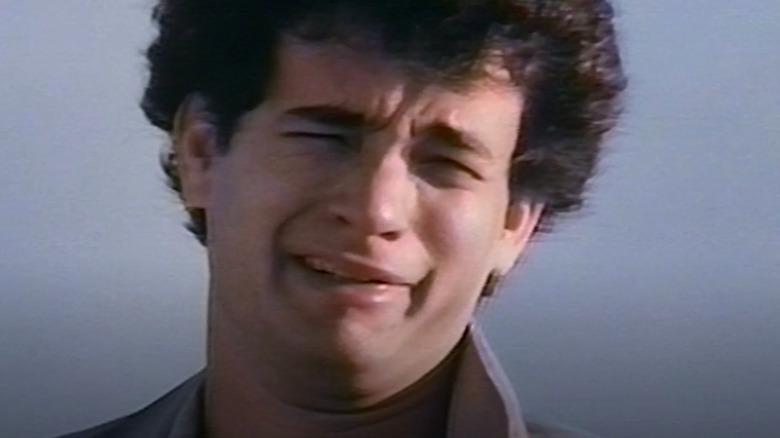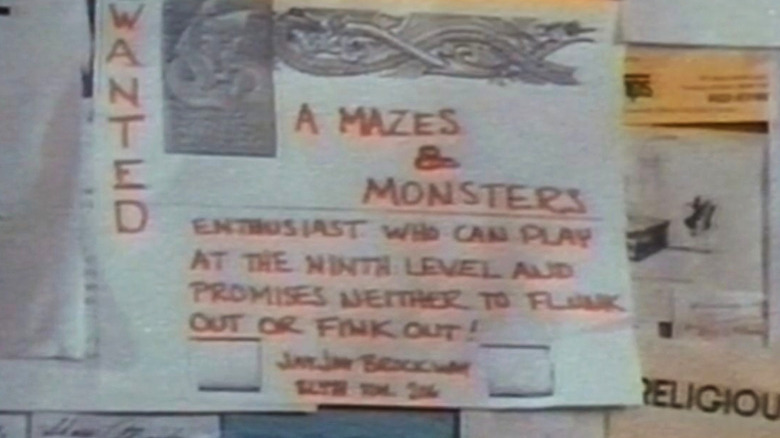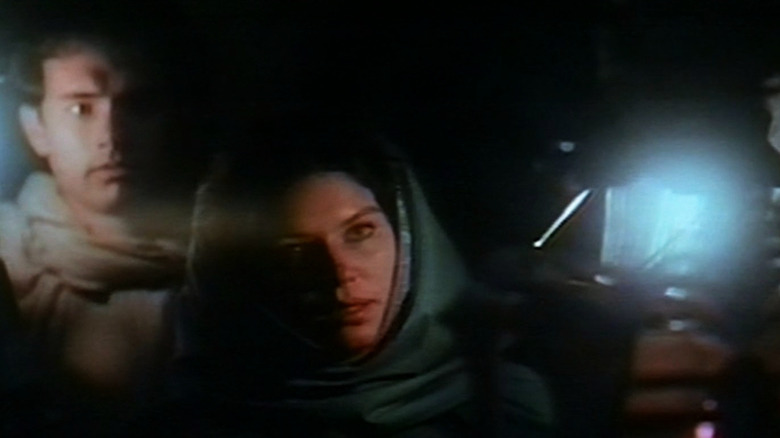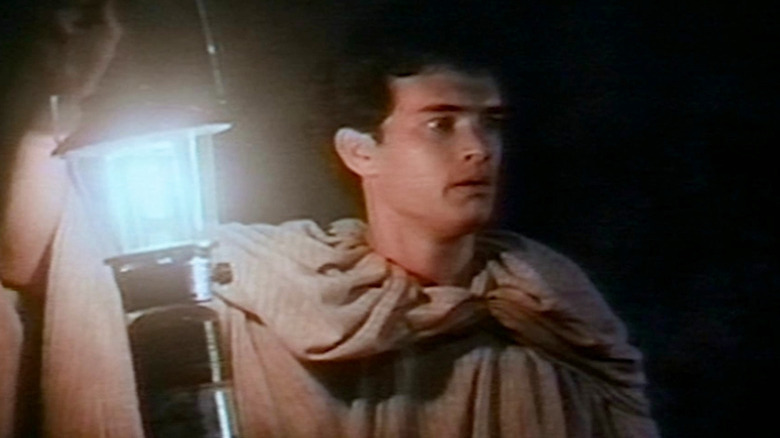Tom Hanks's First Lead Role Was In A Movie About How Dungeons & Dragons Will Destroy Your Children
Stirring parents up into a paranoid mob is an American tradition, and it's one of our lousiest. The poorly-researched anti-comic book tome "Seduction of the Innocent" led to a public comic book burning in the 1950s and decades of oppressive self-censorship within the publishing world. Violent video games like "Mortal Kombat" were accused of corrupting our children in the 1990s, leading to congressional hearings and a video game rating system.
That these waves of mob mentality are almost universally viewed, years later, as embarrassing ignorance and/or obvious manipulations doesn't seem to stop the cycle from starting up, over and over again. Apparently, nobody ever learns anything. Even when we finally admit that there was nothing terribly sinister about the role-playing game Dungeons & Dragons — which was also accused of corrupting kids for many years — and transform it into a family-friendly fantasy movie (for the second time), we find ourselves entrenched in even more harmful frenzies over topics which are clearly little more than shameful scare tactics.
But it's worth remembering that, for a while, the historical moral panics we laugh at today were treated very seriously, and were themselves a part of the cultural landscape. And one of the more curious examples is the film "Mazes and Monsters," which gave us Tom Hanks's first starring role in a movie and taught us that to play Dungeons & Dragons was to play with madness and murder.
No time to dice
Tom Hanks wasn't a nobody when he made "Mazes and Monsters." He'd already made his big screen debut in a small but scene-stealing role in the (pretty danged good) slasher "He Knows You're Alone," before co-starring in the briefly popular, but ultimately flash-in-the-pan sitcom "Bosom Buddies," about two men who dress as women so they can live at an affordable hotel that doesn't allow male tenants. In a couple of years, he would be headlining hit comedies like "Bachelor Party" and "Splash." But in the middle, he LARPed his way into terror.
Based on a novel by Rona Jaffe, which was inspired by only somewhat-true events, "Mazes and Monsters" stars Hanks as Robbie, a college student whose brother ran away from home and whose parents hate each other. He was kicked out of his first college for playing too much Mazes and Monsters — the film's fictionalized version of Dungeons & Dragons — and he promises his parents he won't ever play the game again.
This lasts about one day because he quickly finds a notice on a bulletin board — oh geez, do we have to explain bulletin boards? Try to imagine Twitter on physical media, it was kinda like that — where a group of M&M enthusiasts (the game, not the candy) are looking for another player. They then proceed to peer pressure the living hell out of Robbie until he finally agrees to join them. Just say no, Robbie! Just say no!
But for a while, Robbie is able to balance his school work, his role-playing games, and even a romance with one of his fellow players, Kate, played by Wendy Crewson ("Air Force One"). Yes, it was the college experience of his dreams... until LARPing turned it into a nightmare.
The world according to LARP
It turns out that, according to the movie "Mazes and Monsters," every single person who's attracted to role-playing games is suffering from extreme mental health issues and/or is the product of a "broken" home. All of Robbie's fellow players are experiencing various forms of psychological strife, including the teenage super-genius Jay Jay, played by Chris Makepeace ("Meatballs"). When Jay Jay finds out that Robbie and Kate are dating, he considers ending his own life in a nearby cavern that's off-limits to students because it's, you know, really cavernous. But instead, he decides to invent a live-action role-playing (LARPing) element for their favorite game and fill the deadly cave with skeletons and other gimmicks.
Unfortunately, when Robbie enters the cavern, he experiences a traumatic hallucination of a giant monster, and even though he's supposed to be playing a peaceful cleric, his first reaction is violence. This, combined with his abandonment issues, leads him to experience vivid dreams where a godlike version of his missing brother tells him to live out the life of his Mazes and Monsters character, break up with Kate, isolate himself from his friends, and pursue a dangerous quest. When Robbie's friends discover that he's disappeared, and figure out that he believes he's his role-playing character, they immediately ditch the evidence that they were LARPing and tell the police they think he's trapped in the caverns.
Except he's not. After a very, very long time, we learn that Robbie actually fled to New York City, where he's attacked in an alley, kills a man, and tries to get to the top of the World Trade Center in pursuit of his quasi-religious quest. And somehow it gets worse.
Hanks for nothing
"Mazes and Monsters" ends with all of Robbie's friends growing into better people — symbolized by their rejection of role-playing games — and visiting Robbie at his home, where they discover to their horror that his mental health has deteriorated, and he thinks he's a cleric all the time. With no denouement suggesting he'll ever improve, the implication is that Dungeons & Dragons — sorry, Mazes and Monsters — is just too dangerous for sensitive kids. And by extension, probably for anyone.
It must be said that the cast of "Mazes and Monsters," especially Tom Hanks, are taking this material seriously. When Robbie tells Kate about his missing brother, you can catch a glimpse of the dramatic talent that would eventually make Hanks one of the most respected actors of his generation. But this film was clearly produced to capitalize on a wave of paranoia, a condescending melodrama for parents to watch and cluck their tongues at, "knowingly."
Never mind that the real incident Rona Jaffe's story was based on, in which a college student named James Dallas Egbert III disappeared in the steam tunnels underneath Michigan State University, allegedly as a result of a role-playing game, turned out to be misreported. Egbert played Dungeons & Dragons but that wasn't the motivation for his disappearance. He was a troubled youth who attempted self-harm in the steam tunnels due to a variety of mental health issues. Then he stayed with a series of friends and moved to a different city. Tragically, he later took his own life. But there was no evidence that his death had anything to do with games.
But then, why let the truth get in the way of a moral panic? "Mazes and Monsters" touches on the psychological issues of its characters, but it spends so much time demonizing a tabletop game that it never explores those struggles fairly, or realistically. It's a scare film and not a very good one. It would have probably languished in obscurity like so many other flash-in-the-pan TV movies if Hanks hadn't become one of the biggest actors in the world.



